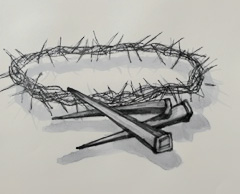“Seated in a window was a young man named Eutychus, who was sinking into a deep sleep as Paul talked on and on. When he was sound asleep, he fell to the ground from the third story and was picked up dead. Paul went down, threw himself on the young man and put his arms around him. “Don’t be alarmed,” he said. “He’s alive!” Then he went upstairs again and broke bread and ate. After talking until daylight, he left. The people took the young man home alive and were greatly comforted.”
Acts 20:9-12 (NIV)
This is an unusual story, containing a bizarre montage of scenes. Paul was preaching to a church full of people on a third floor level of a building. A young man named Eutychus, was sitting in the window, and fell asleep during the sermon. He fell out of that window, three stories down and died. Paul ran downstairs to the dead boy, and while holding him in his arms, he assured the people that the boy will live. The boy came back to life and all the people were grateful.
While everyone was still in a stunned state of mind, from the traumatic, but miraculous sequence of events, Paul returned to the third floor congregation and finished by serving holy Communion to all of them. Then he continued teaching and preaching until daylight the next morning.
The name, Eutychus, is pronounced as Uticus, in English, and it means fortunate, in Greek. Eutychus had the good fortune of being brought back to life after a deadly fall, and it happened just in time for Communion. There must be a message for believers in all of the strange, but wonderful events in this story.
The story began with drowsiness. Maybe Eutychus’ drowsiness is a metaphor for spiritual drowsiness. There are repeated warnings throughout scripture, that we need to stay awake, keep sober minded and be vigilant, so that we are not misled or distracted by the things that can shift our focus or dull our spiritual senses. (1 Peter 5:8)
Eutychus got drowsy and fell to his death. Paul prayed for him and he was miraculously raised to life again. Drowsiness preceded his death, as spiritual drowsiness robs us of our joy during certain trials. Eutychus woke up in the arms of Paul, and we also will wake up from our drowsiness, in the arms of Jesus.
Whether we or a loved one is facing a serious illness, or whatever is causing some kind of grief, it’s very tempting to withdraw from others and isolate ourselves. I did this while I was a caregiver for my sick husband in 2019. I couldn’t get to church much at all, so I eventually cut myself off from church life. I became spiritually drowsy, and lost my focus on God. I barely prayed, lost my joy and was about to fall out of that same window that Eutychus fell out of, when Jesus woke me up one day, and I realized His arms were around me the whole time.
There is something therapeutic in telling God how we really feel, whether we feel angry, sad, fearful or hopeless. Instead of saying all the proper words and reciting prayers that we think He wants to hear, inner healing begins through honest conversations with God.
Even Jesus was honest enough to ask the Father if the cup of suffering could be removed from Him. David lost his focus several times, but his honest conversations with God, led him back to a sustaining intimacy with Him.
After bringing Eutychus back to life, Paul returned to that third floor church and served Communion to his congregation. The element of our redemption, that is most valuable in helping us to live an abundant life, is the blood of Jesus. By His blood, we are delivered from all evil, and we are continuously cleansed and renewed. Holy communion repeatedly brings that reality to us.
Like Eutychus, we will have times of spiritual drowsiness and lose focus, but we will also have many spiritual resurrections in a lifetime, being awakened in the arms of Jesus, and renewed by the Holy Spirit. Nothing can ever separate us from the kind of love that awakens, resurrects and sustains us, because we are all being embraced in the arms of Christ.
“For I am convinced that neither death nor life, neither angels nor demons, neither the present nor the future, nor any powers, neither height nor depth, nor anything else in all creation, will be able to separate us from the love of God that is in Christ Jesus our Lord.”
(Roman’s 8:38-39)
Lord, help us to stay alert and sober in spirit, so that we may always know that the your arms are around us. We will trust in your precious blood, and as we share our honest thoughts with you, renew our hearts and restore to us the joy of our salvation. Amen

